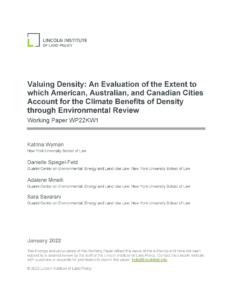This study looks at the extent to which major cities in the United States, Australia, and Canada assess the climate impacts of densification through the environmental review process. Research indicates that greater urban density is associated with lower household greenhouse gas (GHG) emissions in high GDP countries. Yet there is reason to believe that cities may be taking a parochial approach to evaluating the climate impacts of rezonings in their environmental reviews that fails to consider the environmental costs of maintaining low density.
In this study, we survey the legal and policy frameworks governing the environmental review in American, Australian, and Canadian cities to determine the extent to which they consider and analyze the GHG benefits of land use changes that increase urban density. We also analyze environmental review documents for proposals to increase residential density in cities to determine the extent to which policy makers have incorporated empirical knowledge regarding the relationship between density and GHGs emissions into their environmental reviews of proposed land use changes.
We find that very few cities of those we surveyed use a formal environmental review process for analyzing the GHG impacts of land use changes. In addition, the small number of cities in our survey that analyze the GHG implications of land use changes do not appear to comprehensively consider the broader GHG benefits of densification. In fact, cities that assess the GHG impacts of zoning changes appear more likely to consider densification as causing climate harms rather than climate benefits.

